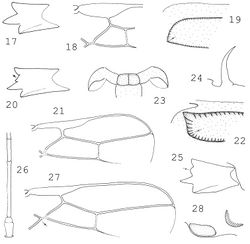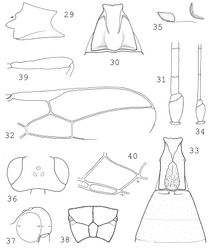Telmogarbus
| Notice: | This page is derived from the original publication listed below, whose author(s) should always be credited. Further contributors may edit and improve the content of this page and, consequently, need to be credited as well (see page history). Any assessment of factual correctness requires a careful review of the original article as well as of subsequent contributions.
If you are uncertain whether your planned contribution is correct or not, we suggest that you use the associated discussion page instead of editing the page directly. This page should be cited as follows (rationale):
Citation formats to copy and paste
BibTeX: @article{Papp2012JournalofHymenopteraResearch28, RIS/ Endnote: TY - JOUR Wikipedia/ Citizendium: <ref name="Papp2012Journal of Hymenoptera Research28">{{Citation See also the citation download page at the journal. |
Ordo: Hymenoptera
Familia: Braconidae
Name
Telmogarbus Papp, 2012 gen. n. – Wikispecies link – ZooBank link – Pensoft Profile
Type species:
Telmogarbus olivai gen. et sp. n. (monobasic and present designation).
Etymology
The new genus receives the fantasy name, Telmogarbus.
Description
Body gracile. Antenna filiform, flagellomeres very long. Head in dorsal view transverse, eye distinctly longer than temple (Fig. 36). Mandible with four teeth, fourth tooth between first and second teeth (Fig. 20, see arrow). Maxillary palp very long, about twice as long as height of head. Face and clypeus much wider than high. Paraclypeal pit short, i.e. not reaching compound eye (Fig. 35). Ocelli medium-sized, elliptic. Pronope small, distinct. Notauli evenly deep, meeting behind, finely crenulate; mesoscutal dimple missing. Prescutellar furrow wide, with a few crenulae. Axille with pair of lamelliform excrescences (Fig. 23). Metanotum medially with thin, long spine curving posteriorly (Fig. 24).Propodeum polished, carinate (Fig. 38). Precoxal suture distinct, crenulate. Epicnemial carina present. Legs long and thin. Fore wing as long as body. Pterostigma widening medially, second submarginal cell long: 3–SR clearly longer than 2–SR, m–cu interstitial (Fig. 21). First tergite petiolate, beyond first tergite metasoma narrow, tergites polished, tergites 2–3 fused (Fig. 33). Hypopygium small, ovipositor sheath short. Ground colour of body yellow to (light) brown. Wings hyaline.
Diagnosis
The new genus is near to the Palaearctic genus Kritscherysia Fischer (Fischer 1993[1]: 484), to the Neotropic Gnathopleura Fischer (Fischer 1975[2]: 128) and to the Palaearctic / Oriental / Nearctic genus Cratospila Foerster. The generic differentation of the four genera is presented below.
1.) Distinction between Kritscherysia and Telmogarbus: Common features of the two genera are the pair of more or less lamelliform excrescenses laterally from the prescutellar furrow (or on axillae) (Fig. 23; Abb. 54 in Fischer 1993[1]: 485), long second submarginal cell (Fig. 21; Abb. 51 l.c.), long flagellomeres (Figs 26, 34) and ground colour of body yellow to light brown. The two genera are distinguished as follows.
Original Description
- Papp, J; 2012: Five new braconid species from Colombia (Hymenoptera, Braconidae) Journal of Hymenoptera Research, 28: 67-84. doi
Other References
- ↑ 1.0 1.1 1.2 1.3 1.4 Fischer M (1993) Zur Formenvielfalt der Kieferwespen der Alten Welt: Über die Gattungen Synaldis Foerster, Trisynaldis Fischer und Kritscherysia Fischer gen. n. (Hymenoptera, Braconidae, Alysiinae). Annalen des Naturhistorischen Museum in Wien 94–95(B): 451–490.
- ↑ Fischer M (1975) Taxonomische Untersuchungen an neotropischen Alysiini, besonders solchen aus dem British Museum (Nat. Hist.) in London (Hymenoptera, Braconidae: Alysiinae). Studia Entomologica (Rio de Janeiro) 18(1–4): 127-152.
- ↑ 3.0 3.1 3.2 Yu D, Achterberg C v, Horstmann K (2005) World Ichneumonoidea2004, Taxonomy, biology, morphology and distribution. Taxapad 2005: Scientific names for information managegement. http://www.taxapad.com/local.php
- ↑ 4.0 4.1 4.2 4.3 Wharton R (1997) Subfamily Alysiinae. In: Wharton RA, Marsh PM, Sharkey MJ (Eds) Manual of the New World genera of the family Braconidae (Hymenoptera) 1: 85-116.
Images
|

